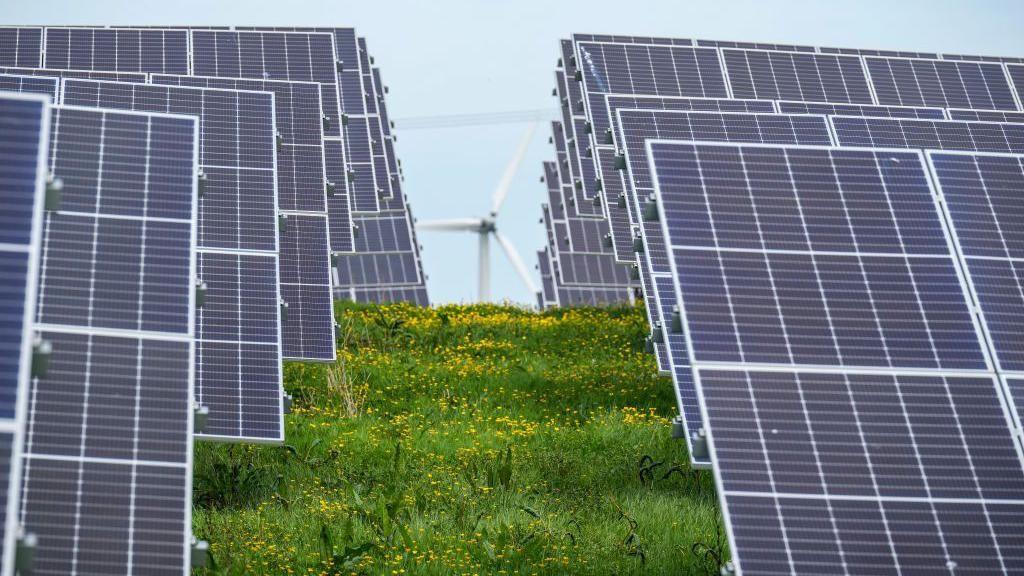Council backs legal review of controversial solar farm

The Alaw Môn development would see panels installed across 660 acres of land near Llyn Alaw in the centre of Anglesey
- Published
Councillors have backed plans to launch a judicial review of the Welsh government's decision to allow a controversial solar farm.
In August Rebecca Evans, the Welsh government's secretary for economy, energy and planning, approved the Alaw Môn scheme, which would see solar panels installed over 660 acres of land near Llyn Alaw on Anglesey.
It hoped to produce enough energy to power about 34,000 houses, or the equivalent of every household on the island.
But it was met with resistance, and the authority claimed the Welsh government went against its own planning guidelines, voting on Thursday in favour of the principle of launching a legal challenge against the government's decision.
The proposal is dependent on expert legal opinion if such an effort would stand a chance of success in the courts, with the window to appeal closing on 7 October.
Members supported the council exploring its own legal challenge, or offering financial support for a community group to do so.
Controversial solar farm plans get green light
- Published26 August
Plans to speed up decisions on wind and solar farms
- Published13 November 2024
Can north Wales become a green hub of Europe?
- Published23 December 2024
The motion before the full council received overwhelming cross-party support, with only one independent member voting against and the three-member Labour group abstaining.
The council leader said many on the island were outraged by the Welsh government's decision.
"We are not opposed to solar or renewable energy in this chamber", said Gary Pritchard, Anglesey's Plaid Cymru leader.
"What we object to is the way this development has been set out, there are alternative ways of doing this," he said.
"You only have to look at a car park 100 meters from here, there are panels along the parking bays... there's brownfield land not being used.
"This development is about stealing so many acres of good agricultural land at a time that we know there are food security concerns.
"In Wales we supply and generate more energy than we use."
Approving the Alaw Môn development, Ms Evans said the "benefits outweighed any harmful effects", referring to the government's targets to produce 70% of electricity by renewable means by 2030.
Developers Enso Energy are understood to have offered a community legacy fund expected to contribute about £32,000 a year (or £1.28m over the project's lifetime).
But concerns have been raised locally that some factors had not received enough attention - including any effect on local drinking water.
The application area is only about 400m (1,300ft) away from Llyn Alaw, which is the source of drinking water for the northern half of the island.
But there was also some support for the scheme within the council chamber.
Independent councillor, Bob Llewellyn Jones, described the government as being at a "crossroads in terms of cutting our carbon emissions" adding that "sheep could continue to graze underneath such solar panels".
"There is an opportunity here to show that we are serious in the war against global warming," he said.
"I ask you to think again about voting against this important development."
But the leader of his independent group, councillor Aled Morris Jones, was firm in his opposition.
"This is drowning a community, like Tryweryn," he said.
"But not with water.. the intention here is to drown them with solar frames."